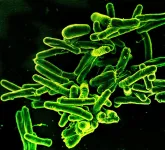(Press-News.org) What explains persistent racial disparities in policing, despite police departments’ repeated investments in bias-training programs? A wide range of data indicate that police in the United States tend to stop, arrest, injure, or kill more Black people than White people. Calvin K. Lai (Washington University in St. Louis) and Jaclyn A. Lisnek (University of Virginia) analyzed the effectiveness of a day-long implicit-bias-oriented diversity training session designed to increase U.S. police officers’ knowledge of bias, concerns about bias, and use of evidence-based strategies to mitigate bias. Their findings, recently published in Psychological Science, suggest that “diversity trainings as they are currently practiced are unlikely to change police behavior.”
Immediately after these trainings, police officers have strong intentions to use the strategies they’ve learned, explained Lai in a forthcoming interview on Under the Cortex, the APS podcast. But “one month later there wasn’t that kind of follow through.”
In 2020 and 2021, Lai and Lisnek evaluated 251 training sessions (in-person or remote) in which 24 different educators taught the Managing Bias program—developed by the Anti-Defamation League to reduce the influence of biases in the behaviors of police officers, improve the relationship between the community and the police, and increase safety—to different police departments with a history of Black–White racial disparities in policing. This day-long training consists of an interactive workshop, led by two educators, that uses activities to educate officers about the origins and differences between explicit and implicit bias, how biases may affect their behavior, and gaps in understanding between police and the community. After learning about biases, officers were trained on strategies and skills to reduce biased behavior.
Lai, a recipient of the APS 2023 Janet Taylor Spence Award for Early Career Contributions, and Lisnek surveyed police officers immediately before the training to establish a baseline, assessing knowledge and concern about bias, usage of strategies to manage bias, and characteristics relevant to police training (e.g., centrality of police identity, expectations of respect from community members). A second survey, administered immediately after the training, evaluated knowledge and concern about bias plus the intention to use the strategies to manage bias.
Results indicated that before the training, officers showed low understanding of and concern about bias, but the training immediately increased their knowledge and concern about bias. Right after the training, officers reported feeling empowered and motivated to use the strategies they learned to manage bias. However, another survey one month later found that officers’ concerns about bias had returned to pre-intervention levels and their use of these strategies had declined compared with their reported intentions immediately after training. Nevertheless, their general understanding of biases remained as high as immediately after the training.
Future research, Lai said, will attempt “to close that gap between officers really being motivated but not finding ways to follow through using some of these bias mitigation strategies.”
The researchers also identified characteristics of diversity training that might affect its efficacy. For instance, previous literature has suggested embedding such efforts with other organizational initiatives, having managers reinforce them, and evaluating expected behavior as a part of job performance. The training examined in this study was implemented and administered by an external organization. Adding booster sessions instead of a one-and-done training model could also increase effectiveness, Lai and Lisnek said.
Finally, the strategies taught could have had low applicability outside of a lab in real-world policing, another factor that can also undermine training effectiveness. “One of the things we’re finding is that there might not be these great one-size-fits-all solutions for combating bias at work,” said Lai. It may be necessary “to think very concretely and specifically” about the daily work activities where police officers may be inclined to discriminate—and then provide “super-tailored strategies” to mitigate those behaviors.
Journalists: email news@psychologicalscience.org for a copy of this research article.
Reference
Lai, C. K., & Lisnek, J. A. (2023). The impact of implicit-bias-oriented diversity training on police officers’ beliefs, motivations, and actions. Psychological Science. https://journals.sagepub.com/doi/10.1177/09567976221150617
END
Diversity training for police officers: one-and-done efforts aren't enough
Recommendations include "booster" training, embedding lessons and strategies with other organizational initiatives
2023-03-06
ELSE PRESS RELEASES FROM THIS DATE:
As naloxone treatment becomes more widespread heroin use is not on the rise among adolescents
2023-03-06
March 6, 2023-- The adoption of laws around naloxone use is not associated with changes in adolescent lifetime heroin or injection drug use (IDU), finds a new study at Columbia University Mailman School of Public Health. According to latest results, naloxone access and pharmacy naloxone distribution were more consistently associated with decreases rather than increases in lifetime heroin and IDU among adolescents. While some critics contend that naloxone expansion may inadvertently promote high-risk substance use behaviors among adolescents, until now this question had not been directly investigated. The ...
Small changes in the kitchen can lead to big impact on your family’s health
2023-03-06
DALLAS, March 6, 2023 — What people eat and drink affects heart and brain health and is essential for managing health conditions like blood pressure, diabetes and high cholesterol. Hispanic adults are at higher risk for Type 2 diabetes and have some of the highest prevalence of poorly controlled blood pressure,[1] two major risk factors for heart disease.[2] As a champion for health equity, today the American Heart Association, the leading global voluntary health organization dedicated to fighting heart disease and stroke for all, launched ‘Together at the Table/ Juntos En La Mesa.’
The campaign is designed to inspire ...
Roy and Diana Vagelos Institute for Biomedical Research Education launched at Columbia University with $175 million gift
2023-03-06
NEW YORK, March 6, 2023—With the COVID-19 pandemic highlighting the critical importance of biomedical research and new questions being raised about society’s capacity to generate world-changing scientific breakthroughs,1, Roy and Diana Vagelos have made a $175 million gift to Columbia University to address this need. The Vagelos Institute for Biomedical Research Education created with this gift will be home to PhD students pursuing the most creative, potentially disruptive ideas in biomedical science, and will spur the training of more physician-scientists able ...
Being sleepless in Seattle – or anywhere – may spell trouble for your heart
2023-03-06
DALLAS, March 6, 2023 — Scientific researchers have noticed a marked increase in heart attacks and strokes in the days following the change to daylight saving time each spring. However, the American Heart Association, the leading global health organization dedications to fighting heart disease and stroke, says losing sleep anytime can be a major risk factor for cardiovascular disease.
“Getting a good night’s sleep every night is vital to cardiovascular health. Adults should aim for an average of 7-9 hours, and babies and kids ...
This starchy bioplastic could make soggy paper straws a thing of the past
2023-03-06
In the fight against pollution, several regions in the U.S. have banned the use of plastic straws. Alternative materials exist, but most options are either too expensive to scale up, go limp in drinks or taste bad. But now, a team reporting in ACS Omega has developed a new type of bioplastic film from all-natural, degradable materials that can be rolled into a straw that doesn’t get soggy and is stronger than plastic.
As efforts to reduce plastic waste take hold, many researchers and companies have turned to plastic alternatives to fabricate straws that comply with new laws and regulations. But so far, most options either end up breaking ...
Octapharma USA research at AAAAI: cutaquig® study at higher infusion rates presented
2023-03-06
PARAMUS, N.J. (March 6, 2023) – Octapharma USA presented research at the American Academy of Allergy, Asthma & Immunology (AAAAI) Annual Meeting evaluating the efficacy and safety of cutaquig® (Immune Globulin Subcutaneous [Human]-hipp, 16.5% solution) infusions at higher infusion parameters, potentially offering greater dosing flexibility for patients.
Subcutaneous immunoglobulin (SCIG) has been an accepted mode of infusion for over 30 years and, with its increased utilization, improvements in methodology now drive replacement therapy in patients with primary immune deficiency. To further explore dosing flexibility with potential reductions ...
Erratic sleep patterns linked to elevated blood pressure in teens with extra belly weight
2023-03-06
Research Highlights:
A new study found that the link between excess weight and higher blood pressure in adolescents was stronger among those who also had irregular sleep patterns.
Irregular sleep patterns contributed to elevated blood pressure in teens who had more visceral fat (excess weight in the belly/abdominal area).
The researchers suggest that school schedules and extracurricular responsibilities often clash with teens’ natural tendency to go to bed later and sleep later, which may lead to irregular timing of sleep and a cascade of consequences for heart health later in life.
Embargoed until 4 a.m. CT/5 a.m. ET Monday, March 6, 2023
DALLAS, March ...
Temperature-stable TB vaccine safe, prompts immune response in NIH-supported study
2023-03-06
WHAT:
A clinical trial testing a freeze-dried, temperature-stable experimental tuberculosis (TB) vaccine in healthy adults found that it was safe and stimulated both antibodies and responses from the cellular arm of the immune system. The Phase 1 trial was supported by the National Institute of Allergy and Infectious Diseases (NIAID), part of the National Institutes of Health. A non-temperature stable form of the candidate previously had been tested in several clinical trials. However, this was the first clinical trial of any subunit TB vaccine candidate in a temperature-stable (thermostable) form. Results are published in Nature Communications.
The ...
The Access to Advanced Health Institute reports encouraging results of first-in-human trial of its temperature-stable tuberculosis vaccine candidate
2023-03-06
The Access to Advanced Health Institute (AAHI) published results of a Phase 1 clinical trial demonstrating the safety and immune responses in a new vaccine against tuberculosis (TB), the world’s second deadliest infectious disease (NCT03722472). AAHI’s TB vaccine combines several proteins from Mycobacterium tuberculosis (Mtb), the bacterium that causes TB, into a fusion protein (“ID93”) with a proprietary immune-stimulating adjuvant (“GLA-SE”) in a freeze-dried formulation that can be stored at elevated temperatures ...
The next pandemic: Researchers develop tool to identify existing drugs to use in a future outbreak
2023-03-06
A global team of researchers has created an algorithmic tool that can identify existing drugs in order to combat future pandemics. The work, reported in the Cell Press journal Heliyon, offers the possibility of responding more quickly to public-health crises.
“There is no silver bullet to defeat the Covid pandemic as it takes us over a public-health roller-coaster of deaths and devastation,” explains Naomi Maria, an immunologist, a visiting scientist at New York University’s Courant Institute of Mathematical Sciences, and the paper’s lead author. “However, using this AI tool, coupled with in vitro data and other resources, we’ve ...
LAST 30 PRESS RELEASES:
Molecular glue discovery: large scale instead of lucky strike
Insulin resistance predictor highlights cancer connection
Explaining next-generation solar cells
Slippery ions create a smoother path to blue energy
Magnetic resonance imaging opens the door to better treatments for underdiagnosed atypical Parkinsonisms
National poll finds gaps in community preparedness for teen cardiac emergencies
One strategy to block both drug-resistant bacteria and influenza: new broad-spectrum infection prevention approach validated
Survey: 3 in 4 skip physical therapy homework, stunting progress
College students who spend hours on social media are more likely to be lonely – national US study
Evidence behind intermittent fasting for weight loss fails to match hype
How AI tools like DeepSeek are transforming emotional and mental health care of Chinese youth
Study finds link between sugary drinks and anxiety in young people
Scientists show how to predict world’s deadly scorpion hotspots
ASU researchers to lead AAAS panel on water insecurity in the United States
ASU professor Anne Stone to present at AAAS Conference in Phoenix on ancient origins of modern disease
Proposals for exploring viruses and skin as the next experimental quantum frontiers share US$30,000 science award
ASU researchers showcase scalable tech solutions for older adults living alone with cognitive decline at AAAS 2026
Scientists identify smooth regional trends in fruit fly survival strategies
Antipathy toward snakes? Your parents likely talked you into that at an early age
Sylvester Cancer Tip Sheet for Feb. 2026
Online exposure to medical misinformation concentrated among older adults
Telehealth improves access to genetic services for adult survivors of childhood cancers
Outdated mortality benchmarks risk missing early signs of famine and delay recognizing mass starvation
Newly discovered bacterium converts carbon dioxide into chemicals using electricity
Flipping and reversing mini-proteins could improve disease treatment
Scientists reveal major hidden source of atmospheric nitrogen pollution in fragile lake basin
Biochar emerges as a powerful tool for soil carbon neutrality and climate mitigation
Tiny cell messengers show big promise for safer protein and gene delivery
AMS releases statement regarding the decision to rescind EPA’s 2009 Endangerment Finding
Parents’ alcohol and drug use influences their children’s consumption, research shows
[Press-News.org] Diversity training for police officers: one-and-done efforts aren't enoughRecommendations include "booster" training, embedding lessons and strategies with other organizational initiatives




